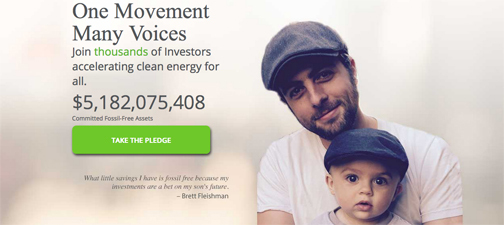One of the big topics currently on the minds of those who are concerned about climate change from college students to those planning for retirement is how to combine concern for the future health of the planet with money issues and economic safety.
Sen. Tom Udall (D-NM) recently put forth an amendment to the Energy Policy Modernization Act of 2016. It called for the Secretary of the Treasury to develop a blueprint to initiate Clean Energy Victory Bonds. The goal was to use the example of World War II Bonds to mobilize the American public, and to raise revenue to finance clean energy undertakings. The projected goal was $50 billion. On April 19, a vote tally of 50 yes and 47 no fell short of the requisite 62 votes needed for passage. The concept was simple and positive, yet the usual naysayers were part of the opposition: Jeff Sessions (R-AL), a top Trump endorser; Chuck Grassley (R-IA), who is blocking the Supreme Court nomination process; James Inhofe (R-OK), climate denier.
Another option is getting traction, and that is the emphasis on divesting from savings and assets that are tied into fossil fuel companies.
The city of Copenhagen announced in February that they would be selling all of its stocks and bonds in gas, oil, and coal. They are positioning themselves to become the first carbon-neutral capitol by 2025.
Prince Charles has moved to purge his foundations and private holdings of all fossil fuel assets. So has Leonardo DiCaprio, of Hollywood royalty. And if dealing with money makes you feel anxious, just know that the Rockefeller Brothers Fund has divested from fossil fuels and is proactively seeking solutions to climate change. I listened to a video of a press conference where Justin Rockefeller discussed how that decision was based on both "moral and financial reasons."
So where does that leave us common folks? Actually, with plenty to do.
A good place to start learning about options is at Divest Invest. They have an extremely robust website with information geared to different groups, including individuals. I spoke with Vanessa Green, who is managing the Divest Invest Individual Campaign, which asks people to take the lead in creating change, "accelerate clean energy for all," while "avoiding unnecessary risk" in their investments. One image showed a father and son with the quote, "What little savings I have is fossil free because my investments are a bet on my son's future."
Green informed me of an online petition put forth requesting American businesses "to offer fossil free 401(k) options." Divest-Invest is part of a coalition of groups driving this agenda.
In context of the concern that people have about their retirement funds, Green noted, "That's why they need to be asking questions. Coal, oil, and gas are increasingly risky investments, particularly for people on fixed incomes," she pointed out. Green explained that that her organization was working to create an "on-ramp" accessibility, so that the public could familiarize themselves with both the "shift in consciousness" and the risks associated with fossil fuel companies in the face of climate change concerns.
Fossil Free Funds is a tool that is easily accessed via the Internet, and measures the climate risk of mutual funds. Yet as Green emphasized, divestment is only one part of the equation. It's a two-part solution which includes changing perceptions and pivoting mainstream thinking. There is a growing push from consumers for Socially Responsible Investment (SRI) and greater transparency. In addition, financial advisors may not be aware of the options available.
Presently trading on the New York Stock Exchange, is a new fossil-free investment from Etho Capital. It's an exchange-traded fund (ETF) that excludes all fossil fuel companies. It also chooses equities based on climate efficiency. I reached out to Ian Monroe, a lecturer and visiting scholar at Stanford University, who is also the President & Chief Sustainability Officer at Etho Capital to learn more. Via e-mail he wrote:
"I started working with climate-efficiency data while teaching courses on solutions to climate change at Stanford, and looking at the sustainability of investments. If we really want to solve climate change, a huge piece of the puzzle is for investors around the world to move trillions of dollars out of dirty energy and into climate solutions. Fortunately, this is starting to happen.
We've created the ETHO ETF to make it easy for everyone to align their investments with their personal values. It is based on our Etho Climate Leadership Index, which invests in the most climate-efficient companies, while removing irresponsible industries (like fossil fuels, weapons, and tobacco). Our performance has shown that you really can invest in ways that are better for both the planet and your portfolio."
"People are the cornerstones of social movements," Green underscored when we spoke. "The more people pay attention to the way big corporations do business, the more they will understand the impact it has on their lives."
This article originally appeared on the website Moms Clean Air Force

